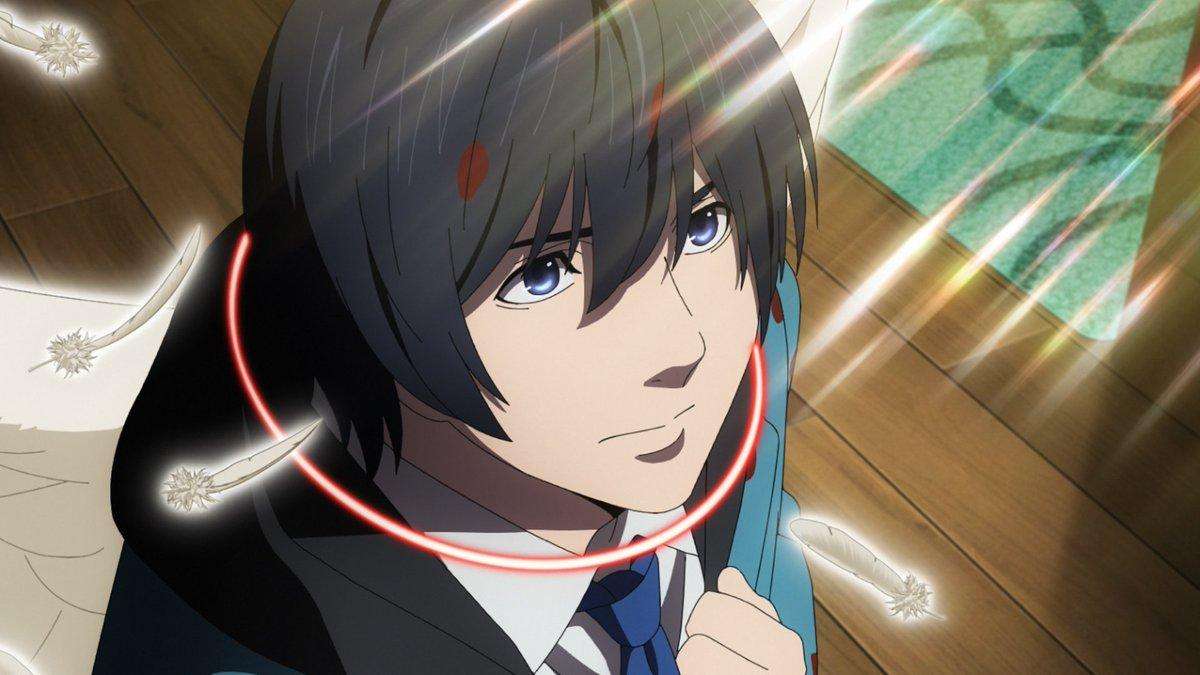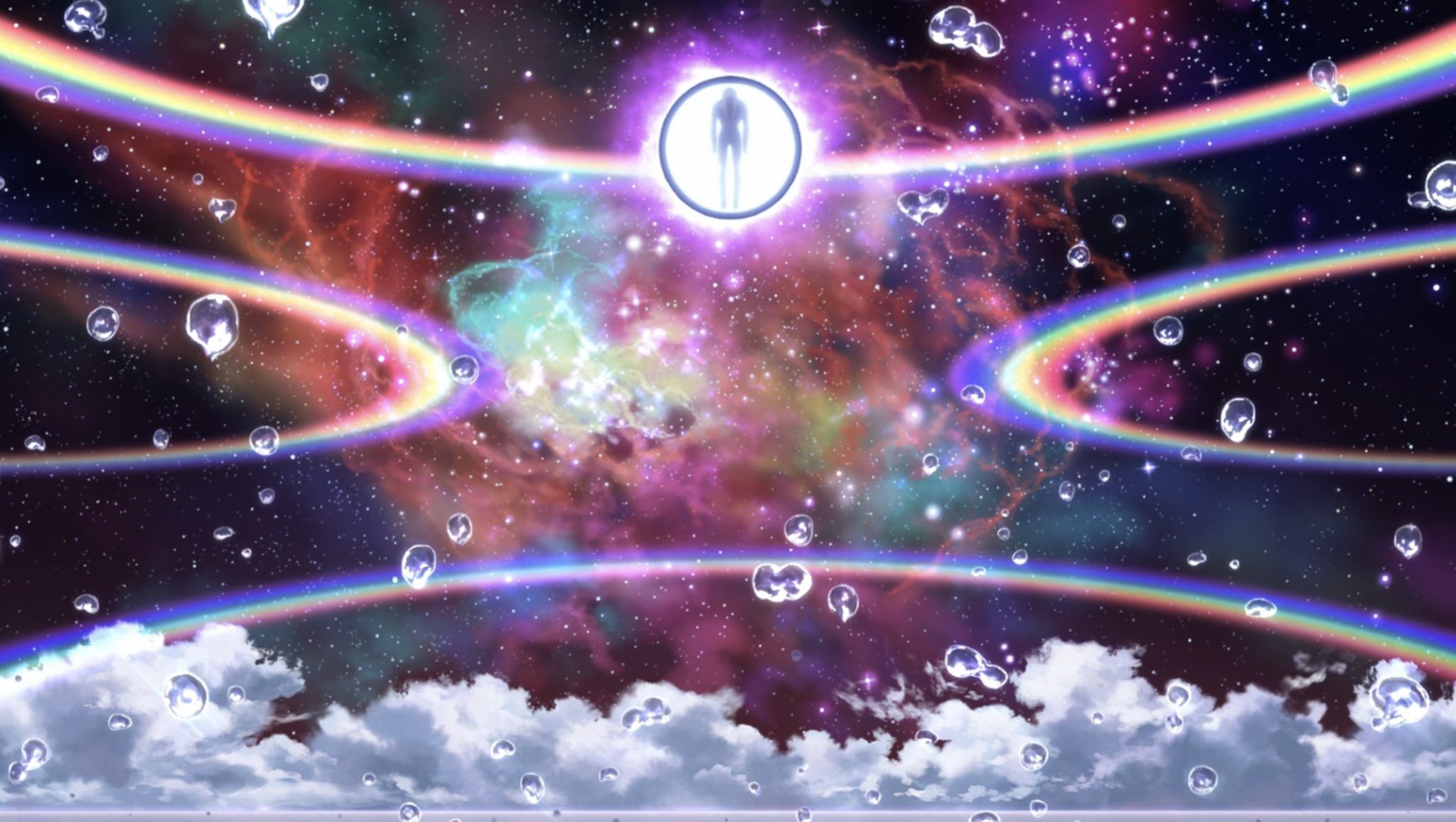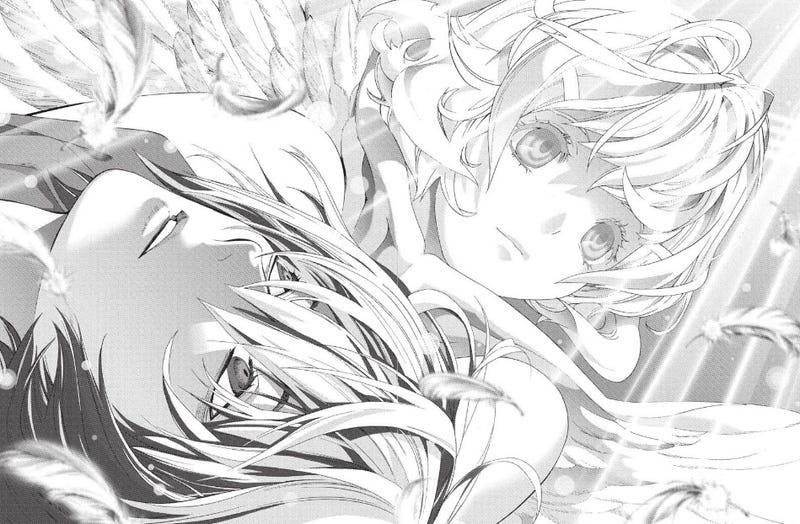Studio: Signal.MD
Director: Kazuchika Kise
Streaming on: Crunchyroll, Funimation
I consider myself a reluctant fan of Tsugumi Ohba and Takeshi Obata. The manga-making duo have collaborated thrice in their careers, the first time to make Death Note. I’ve got a special place in my heart for Death Note, as the first proper anime I’ve ever seen, but I haven’t been able to enjoy it the same way since I was so severely let down by the last third of the show. Before that, though, Death Note wrote the book on suspense and is rightfully praised for it.
After Death Note, the two worked together to create Bakuman, which I adore. While I like its story and characters, it’s a manga about creating manga, and provides a fascinating glimpse into the inner workings of Shonen Jump. That alone is enough to win me over, but managing to transform the grind of mangaka into a compelling shonen story is a bonus.
So this season, I went into the anime adaptation of their third manga, Platinum End, with hesitant optimism. When Ohba and Obata leave it all out on the page, their work is some of the best in the industry. The story had a strange but intriguing premise, and if handled deftly, could prove to be every bit the classic that its predecessors are.
Does Platinum End live up to that legacy? Not quite. I won’t go ahead and call it a wash, not until I’ve said my piece, but it has some quirks that are hard to overlook. Namely that it reads like a grimdark power fantasy written by a socially awkward eighth grader whose mad he got grounded from going to the Green Day concert. I’m actually jealous; if I had written something like this at thirteen, it would have gotten an anime by now.

We don’t get to spend much time with our protagonist, Mirai, before he jumps off a building to his death. It’d be a comically short pilot episode if not for the intervention of his guardian angel, Nasse, who makes him a deal he can’t refuse. Well, he would have refused, but he didn’t believe she was serious and probably assumed this was a prolonged hallucination.
So he’s granted an angel’s Wings and Arrows, one red, and one white. The red arrow produces obsessive love in its targets, while the white instantly slays its victims. Er, those are the sorts of abilities I’d totally give my protagonist if I were a romantically frustrated middle schooler angry at the world, but I’ll suspend my better judgement for the moment.
See, being suicidal qualifies Mirai to be a candidate for God, because apparently God is a hereditary position, and the best people for the jobs are the ones who gave up on living because…they care so much about the state of the world. Also, the new God is chosen via battle royale between these thirteen suicidal people. They didn’t really explain why the previous God retired, because why would you? I’m completely uninterested in finding out why someone who wanted to be God in the first place would eventually give it up.
But instead, the first episode is dedicated to Mirai harnessing his new powers before we get into any of that fight-to-the-death stuff. In particular, he uses his red arrow on his abusive aunt to compel her to commit suicide, and force his uncle to turn himself in for murdering Mirai’s family. It’s a deeply unsettling moment because how Mirai and the story do gymnastics in order for him to ‘accidentally’ force his aunt to kill herself.
Like, if an angel saves you and tells you this arrow has the power to command absolute obedience from a person, you can either take them at their word, or screw around and test it out on live human subjects. Sure, Mirai is genuinely stupid enough to not realize he needs to watch what he says in this or any situation going forward, but it comes across as so painfully contorted.
Ohba clearly didn’t want to stain his protagonist by having him kill, but he still wants the audience to have the satisfaction of watching evil people die. This kind of backwards prioritization is actually the same thing that ruined Death Note.

I am going to liberally apply the word ‘edgy’, simply because there is no better word to describe Platinum End. To be clear, edge isn’t necessary a bad thing. Tackling dark subject matter is what makes anime like Goblin Slayer, Death Parade, and Death Note great. The difference is the intent of the story. Your story can be dark or grim, but when it’s a sloppy vehicle for escapism and wish fulfillment, it’s cringe-inducing.
When Light begins experimenting with the Death Note, he quickly learns that its power is legitimate. The moment he gains this power, the mask slips and we learn he’s a budding maniacal terrorist with a God complex. This is a brilliant setup so that the story can ask important questions about the criminal justice system, free will, and human nature.
Mirai, on the other hand, is given supreme magical power, and treats it like a joke. Even after he’s plucked out of the air by an angel, he starts practicing on his family members like he’s testing spells on Skyrim NPCs. They’re terrible people, but he’s also never raised a hand to them, and we have no indication that he has an inclination towards violence. So when he kills his aunt, it’s downright goofy that he’s shocked and horrified when she dies.
This plot could have worked if its main character (or any of its characters, actually) had a core philosophy or motivation. Mirai doesn’t do anything for any particular reason except short-term gratification, like killing his aunt, or entering the same high school as his crush. And let’s be clear, that’s actually really creepy. Sure, Saki turns out to be a God candidate too, but this guy is completely uninterested in high school, so his sole motive in pursuing an education is putting the moves on a girl?
Why would someone want to become God? Once you get past the omnipotence and whatnot, it’s a fair question. If you were just suicidal, prepared to abandon your life, why would you be interested in immortality? What kind of world would you try to create if you did have that kind of power? Does Mirai hold his convictions strongly enough to kill or be killed for them?
Mirai has no convictions or meaningful characteristics. He’s not especially kid, intelligent, or passionate about anything. He’s an empty vessel with nothing going on. His only goal in life, by his own admission, is to be happy. The reason for that is that his mother told him that you should only be happy so you won’t be bitter towards people who are, and you should only make people happy so they won’t be bitter to you.
That is perhaps the most nonsensical and downright immoral thing someone could ever think of telling a child. That is the kind of thing that will actually destroy a child’s perception of other people and relationships for the rest of their life, and Platinum End treats it like it’s sage wisdom and a compassionate philosophy. “Hey, kid, you need to make you and everyone you know happy, otherwise you’ll hate them, or they’ll hate you?” What? Are you joking?
The story ought to be a tense battle royale between opponents with deeply held opposing ideologies. Everyone should have their own reasons for wanting to become God, and their backgrounds should inform their beliefs. Maybe Mirai could be a pacifist sort who just wants to make life better for people, but no, he’s only pursuing God because he’s an idiot who didn’t realize he signed up for a death game until a few episodes in. Instead, he goofs off and goes to high school because this wouldn’t be a vapid power fantasy if he didn’t.
You know what I’d like to see? Platinum End with Light as the protagonist, because that would actually be interesting. Light has everything Mirai doesn’t: a personality, beliefs, an earnest desire to enact change, charisma. The list goes on, but we’re stuck with this cardboard vanilla wafer who entered the Thunderdome thinking he wouldn’t have to fight or kill anyone.
The only other candidates we know about have as little going on as Mirai. There was the hedonistic comedian who dies immediately to set up Metropolisman, who is kind of dressed like a bootleg Gundam and Power Rangers had a kid and threw it away for being too unoriginal. The only halfway interesting thing going on is that Saki’s angel seems to be pulling her strings, but that’s only possible because Saki is so spectacularly boring that her own angel treats her like a doormat. Oh, and they go to the same high school, because why not?

So Platinum End’s writing is weird, inconsistent, immoral, illogical, and a trainwreck. But it compensates with its art, right? Obata’s illustrations are good on his worst day, and are usually worthy of being put up in the Sistine Chapel. When the artist of your source material is this high-profile, you have to really capture the spirit of their work.
So Platinum End does that by creating perhaps the worst looking anime I’ve ever seen, outside of notable monstrosities Ex-Arm and Handshakers. Obata’s distinctive art style is jumbled at the anime’s best moments, and otherwise completely abandoned for the rest of the production. The character designs start off uninspired like Mirai and Saki, while the angel designs look as though they were rejected designs from a much better anime.
The CGI is atrocious. The entire anime reeks of a rushed schedule, and it stinks the most around Metropolisman. They use CG for all of his action scenes, and it is upsettingly jarring. Don’t worry, though, the compositing is terrible for every character, not just the CG one. Half the time the characters don’t look like they belong in these plain, devoid of detail backgrounds. They use thick line art a lot to make the characters actually stick out more, but has anyone considered how that’s a terrible decision?
Platinum End has one thing going for it visually, and that is its director, Kazuchika Kise, a veteran of the industry. Like, I’m talking an episode director for Evangelion kind of veteran. As such, the scenes are usually decently composed, and the camera angles are interesting. The opening sequence of Mirai’s suicide attempt has a lot of smart or creative choices that initially gave me hope for the series. It’s just that every other aspect of production proved to be lackluster or actively working to ruin the experience.

I didn’t have high standards for Platinum End, and it managed to completely miss those standards, and brutally slaughter my interest in what was a promising new anime. I can’t say for sure this is an issue with the source material or if it’s just a botched adaptation, but I can safely say that the anime has no redeeming qualities whatsoever.
If you read the manga, you at least benefit from Obata’s art, but I have a hard time reconciling this with the guy who wrote Bakuman and the good parts of Death Note. Heck, I have a hard time connecting this with the worst parts of Death Note; the last third of the story was rushed and trite, but it was coherent and the final episode was a good conclusion to the series.
So, with all the great anime coming out this fall, you’re best off skipping Platinum End. This isn’t even good for an ironic hate-watch. You start making fun of how bad it is and you just end up getting angry. Platinum End has been sentence to the unenviable Egregiously Boring.
So if you watch Platinum End and actually want to defend it, the best place to do that is over on Twitter @ExhibitionOtaku. I like getting comments, but some people genuinely try to start arguments in the comments here. Hint: I’m not going to respond to you saying I don’t know what I’m talking about. But, if you’re interested in having a genuine conversation, my DMs are open until the hate mail overwhelms the actual messages. If you want notifications every time the Otaku Exhibition posts a new essay or review, why not follow it on WordPress? Until next time, thanks for reading.
| Boring | Neutral | Entertaining | |
| Egregious | Platinum End | ||
| Mediocre | |||
| Fine | |||
| Pleasing | Takt Op. Destiny | ||
| Fantastic | 86 – Eighty-Six |
One response to “Platinum End Review: Sharp Edge, Handle With Caution”
[…] about The Otaku Exhibition’s post about the edgy Platinum End brought me back to the days when Death Note was the anime everyone was talking […]
LikeLike